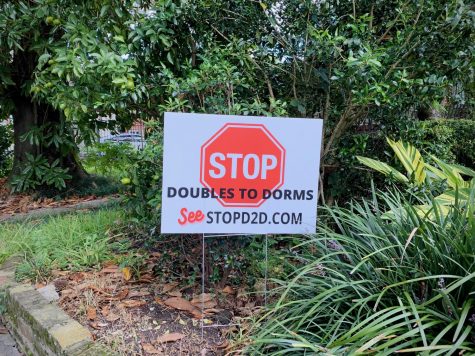“Stop Doubles to Dorms” movement continues amid new school year

Uptown New Orleans residents are continuing to push back against “Doubles to Dorms” — also referred to as “D2Ds”— amid a new round of Tulane University students moving into off-campus residences.
“Doubles to Dorms” is a nickname residents have given to the practice of out-of-state developers purchasing local homes and renovating them to house more people than they were originally designed for. This includes constructing temporary walls and converting dining and living spaces into cramped bedrooms. Critics say those developers leave the homes unavailable for other residents and create uncomfortable spaces for students who wish to live off-campus.
Councilmember Joseph I. Giarrusso III represents District A and has introduced policies to stifle these developers and stop them from converting homes into inefficient student living spaces.
“We passed initial legislation called an interim zoning district to limit the proliferation of doubles to dorms in a certain geographical area,” Giarrusso said. “The IZD, however, is only temporary.”
After working with neighbors, Giarrusso also passed parking requirements for the Holly Grove area, Carrollton, Maple, Black Pearl and Uptown neighborhoods. That requirement allows residents with a homestead exemption to add more bedrooms but places limits on developers renovating homes that are not their primary residences.
“For those who are not homestead exempt owners, if you want to add more than a fourth bedroom, then you need a parking space for the additional bedroom,” Giarrusso said.
Giarrusso grew up in District A, the council district that includes Tulane, and said the focus throughout his time on City Council has remained on residents.
“Developers are buying houses at above market rate, preventing renters from living there and also driving up the market price for homes in the area,” Giarrusso said.
Because the practice pushes up the market price for homes, locals are unable to afford housing in the area. This creates a cycle of gentrification, according to Doubles to Dorms. Giarrusso said students are often unaware of this dynamic.
“Many of us were students once. We understand the fun times of going to college and living in the middle of a city,” Giarrusso said. “The hard part, when you’re in college, you forget other people who are no longer in college who live near you.”
Giarrusso said he believes stopping the Doubles to Dorms movement will not only benefit those trying to live in the neighborhood around campus but students as well. He also said his office has talked with neighbors about the possibility of turning the area into a partial historic district, a move that would make it harder for developers to drastically alter homes.
The goal is to create a community that lives with each other, rather than around each other.
“The small quality of life issues are important and can be as simple as not being loud late at night, taking care of trash and having open dialogue with your neighbors,” Giarrusso said.
However, these various efforts have not completely stopped the Doubles to Dorms practice.
“Has the trend been slowed? Yes. Are developers constantly looking for ways around the legislation? Also, yes,” Giarrusso said.
In order to push the “Stop Doubles to Dorms” movement forward, Giarrusso said the local universities should denounce the practice and direct students away from D2D housing.
Tulane will open 700 new beds in Lake and River Halls in the spring semester and currently offers rental guides and legal services for students seeking off-campus housing.
“The universities have to be more engaged,” Giarrusso said. “They are part of the citizen group that needs to be much louder and take more action.”
Your donation will support the student journalists of Tulane University. Your contribution will allow us to purchase equipment and cover our annual website hosting costs.


